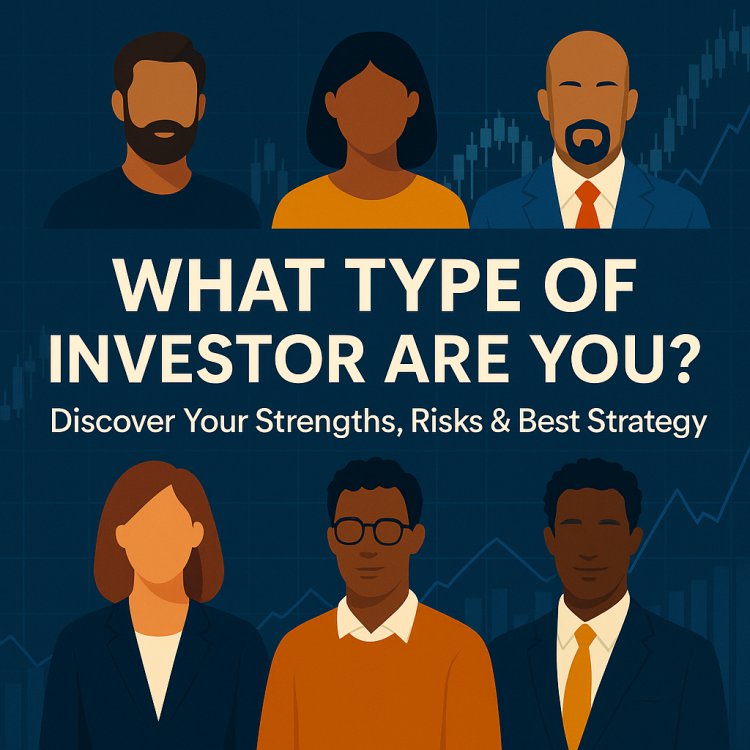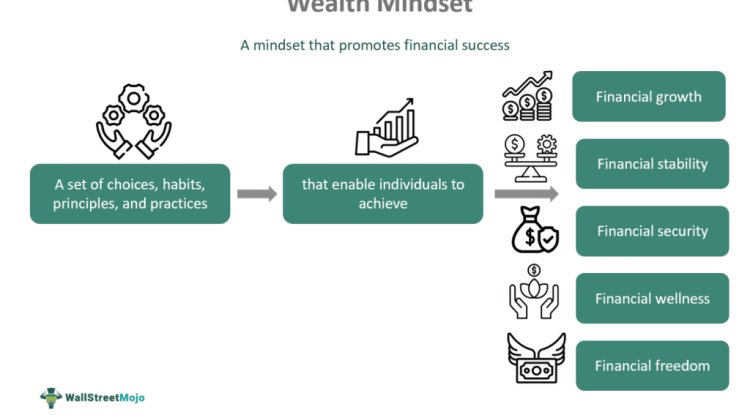Discover Your Investor Personality: The Hidden Key to Smarter Investing
Discover the 5 key investor personality types and how they influence your financial success. Learn which one you are and how to build a smarter investment strategy.

When it comes to building wealth, most people focus on what to invest in — stocks, bonds, real estate, or crypto. But the most overlooked factor in successful investing isn’t the asset class. It’s you.
Understanding your investor personality is the foundation of financial mastery. It shapes your risk tolerance, decision-making style, emotional triggers, and even how you respond to market crashes or bull runs. The better you know yourself, the better your investment outcomes will be.
In this in-depth guide, we explore the five primary investor personality types, how to identify which one you are, and how to use this knowledge to build a portfolio that aligns with your financial goals and emotional wiring.
Why Knowing Your Investor Personality Matters
Every investor sees the world through a different lens. Some crave high returns and are willing to take wild risks. Others prefer security, even if it means slower growth. Still others chase trends, follow advice from peers, or invest to make a social impact.
When you invest without self-awareness, you risk:
-
Making emotional decisions
-
Exiting too early or entering too late
-
Falling for hype, scams, or bad advice
-
Building a portfolio that conflicts with your values
However, when your investment approach aligns with your psychology, you reduce stress, increase confidence, and make better decisions over time.
Let’s dive into the five most common investor personality types and see which one best describes you.
1. The Adventurer: The Bold Risk-Taker
Core Traits:
-
Embraces uncertainty and risk
-
Driven by instinct and gut feelings
-
Excited by high-growth, high-volatility opportunities
-
Prefers being an early adopter or angel investor
The Adventurer thrives in dynamic environments. They're the ones investing in the next tech startup, loading up on cryptocurrency, or entering emerging markets before the crowd catches on.
Strengths:
-
Quick to capitalize on unique opportunities
-
Willing to take chances others avoid
-
Potential for outsized gains in short periods
Challenges:
-
Often skips deep research
-
High risk of losing capital due to volatility
-
May struggle with patience or long-term thinking
Ideal Strategy:
Adventurers should balance their high-risk ventures with core investments like ETFs, dividend stocks, or real estate. Consider setting aside a “risk capital” bucket that allows for bold plays without jeopardizing your entire portfolio.
2. The Analyst: The Research-Driven Strategist
Core Traits:
-
Logical, patient, and data-obsessed
-
Uses spreadsheets, models, and charts to guide decisions
-
Needs facts and certainty before acting
-
Prefers slow, steady, and calculated moves
Analysts see investing as a science. They love dissecting financial statements, comparing ratios, and projecting long-term returns. For them, investing without due diligence is like gambling.
Strengths:
-
Rarely acts impulsively
-
Makes well-informed decisions
-
Prioritizes long-term stability and growth
Challenges:
-
Can suffer from analysis paralysis
-
Misses out on fast-moving trends
-
May ignore emotional or human elements of investing
Ideal Strategy:
Analysts thrive in value investing, index fund strategies, or income-generating portfolios. To grow faster, they should sometimes trust their instincts — or diversify with a small allocation to higher-risk plays.
3. The Follower: The Advice-Seeker
Core Traits:
-
Invests based on recommendations from others
-
Follows influencers, friends, or media trends
-
May not fully understand their investments
-
Struggles with independent decision-making
Followers are driven by trust. They often invest through peer influence, trending YouTube videos, or WhatsApp groups. While this provides comfort and community, it also introduces risk if due diligence is lacking.
Strengths:
-
Open to learning from others
-
Quick to act on credible tips
-
Often benefits from community knowledge
Challenges:
-
Vulnerable to scams and groupthink
-
Lacks confidence to invest solo
-
May panic during downturns due to lack of conviction
Ideal Strategy:
Followers should take time to understand every investment they make. Learning the basics of financial literacy, risk assessment, and diversification will make them more independent — and less reactive.
4. The Crowdpleaser: The Emotion-Driven Investor
Core Traits:
-
Invests based on trends, hype, or social acceptance
-
Feels pressure to prove success through visible results
-
Highly influenced by social media or public opinion
-
Makes decisions emotionally rather than rationally
Crowdpleasers want to feel seen and validated. They might invest in IPOs or crypto because “everyone else is,” not because it fits their long-term plan. This can lead to impressive wins — and devastating losses.
Strengths:
-
Passionate and enthusiastic
-
Highly engaged with markets and trends
-
Can spot early waves of momentum
Challenges:
-
Often buys high and sells low
-
May chase popularity instead of value
-
Emotionally reactive to market movements
Ideal Strategy:
Crowdpleasers need to slow down and build discipline. Creating a long-term plan, setting automatic investments, and ignoring social noise will help them stay focused and reduce emotional volatility.
5. The Idealist: The Purpose-Driven Investor
Core Traits:
-
Values impact over income
-
Invests in causes, ESG funds, or sustainable ventures
-
Feels a sense of duty to change the world with money
-
May reject profitable but ethically questionable opportunities
Idealists align their portfolios with their personal mission. They want to support clean energy, diversity, education, or social justice. For them, a return on investment also includes a return on values.
Strengths:
-
Deep commitment and clarity of purpose
-
Emotionally aligned with their money decisions
-
Early adopters of emerging ESG sectors
Challenges:
-
May accept lower financial returns
-
Risk of overlooking red flags in values-driven companies
-
Struggles to detach emotionally during downturns
Ideal Strategy:
Idealists should create a hybrid strategy — invest 70–80% for financial performance and reserve 20–30% for impact or philanthropic causes. This ensures both heart and wallet are satisfied.
What If You’re a Mix?
Most people don’t fit neatly into one category. You might be an Analyst with Adventurer tendencies, or an Idealist who’s learning to become more of a Follower when taking advice from experts.
The key is to understand:
-
Which type dominates your behavior?
-
Which traits help or hurt your portfolio?
-
How can you use this insight to build a strategy you can stick to?
Building Your Personality-Aligned Portfolio
Once you understand your investor type, it’s time to craft a portfolio that supports your psychology, not fights it. Here's how:
1. Know Your Risk Tolerance
Each personality has a different risk comfort zone. Adventurers love volatility; Analysts fear it. Know your limits and invest accordingly.
2. Diversify According to Your Profile
Followers and Crowdpleasers should avoid over-concentration in trendy stocks or crypto. Idealists should balance ESG funds with solid blue-chip investments. Analysts can handle concentration — but only if research supports it.
3. Set Rules — and Stick to Them
Set rules for when to buy, sell, or hold. Automate decisions where possible (like SIPs or DRIPs) to minimize emotional interference.
4. Educate Yourself Constantly
No matter your personality, knowledge is your biggest asset. Read, take courses, and join communities that challenge your thinking.
5. Reflect and Recalibrate
Once or twice a year, evaluate your behavior:
-
Did you panic during market dips?
-
Did you jump into a trend without research?
-
Did you abandon your values or plan?
Use these insights to adjust your strategy.
Real-World Examples
-
Elon Musk is a textbook Adventurer — bold, experimental, and always ahead of the curve.
-
Warren Buffett is the ultimate Analyst — patient, logical, and data-driven.
-
Your friend who bought crypto because “everyone’s doing it”? Crowdpleaser.
-
Someone donating to impact-driven startups? That’s an Idealist.
Final Thought: Invest Inward First
The financial markets will always be unpredictable. But your behavior doesn't have to be.
Knowing your investor personality type helps you:
- Choose strategies that fit your psychology
Minimize regret and emotional mistakes
Build confidence and consistency over time
Align money with meaning and mission
At Wealth Insights Global, we believe wealth isn’t just about what you earn — it’s about knowing how to grow and manage it wisely. Understanding who you are as an investor is the first step to long-term financial freedom.
Ready to grow?
Join our weekly newsletter for personalized wealth tips and tools → https://wealthinsights.co.ke
What's Your Reaction?




















